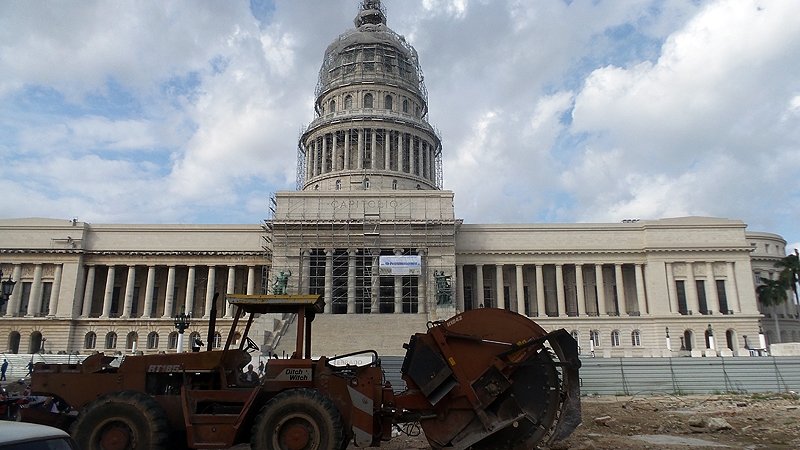 The original Cuban capitol building under renovation in Havana is a replica of the U.S. Capitol. Photo by Jeff Harris
The original Cuban capitol building under renovation in Havana is a replica of the U.S. Capitol. Photo by Jeff Harris
Lakebay resident Jeff Harris visited Cuba for the first time in February to determine the feasibility of a community development project on behalf of the Gig Harbor Rotary Club's International Committee and the Olson Foundation, which he serves as president. He ended his trip discussing the return of nonprofit work to Cuba with the new U.S. ambassador in Havana.
Rotary works to reduce poverty through sustainable development. Harris has a long history in that field stretching from the Peace Corps in Peru to working for the United States Agency for International Development (USAID) in Vietnam during the war, and local nonprofit work in Washington.
"Whatever you think of American foreign policy and our relationship with Cuba, you have to go back to the 1950s," Harris said. "We were fearful of Communism and Russia and what was happening around the world."
Harris joined a weeklong tour organized by Cienfuegos, followed by a second week in Havana. The Sister Cities program works to connect people on a municipal level to organize projects and cultural exchanges. Cienfuegos was chosen for its similarity: a port city of the same size and population with a mixed economy that has been preserved reasonably well. The five-star hotel where the group stayed was built in 1869.
There is also a park built by local Rotarians a century ago.
"What we're trying to do is fund projects that may work from the bottom up," Harris said. "We can't deal with the government. They're perplexed in terms of how to deal with this tsunami that is just washing over Cuba with tourists, money, opportunity. They have to allow people a level of freedom they don't quite have yet."
In 2011, President Raúl Castro, succeeding his brother Fidel, instituted a number of modest reforms: People can now own and sell their own homes, they can start certain businesses, and they pay taxes.
"New shops are going in, and they're crowded," Harris said. "They're very sparsely stocked with goods, but coming.
"The only shortage we observed in Cuba was bread. The state bread stores pass out bread in the morning, and there's always a line."
Cuba boasts free health care, free education, close to 100 percent literacy, a high rate of college graduates and no unemployment, he said. "You have to work, but you don't make much. That's the deal."
"One of the problems they have is the wage structure is fixed. A doctor working as a taxi driver can make more money than he can as a doctor because of tips and other things. Any dictated, structured economy like that, in my view, is not going to work. Wages have to find a level that is dependent upon the market demand and the availability of people to do those jobs," said Harris.
In Havana, Harris said tourist buses lined both sides of the waterfront for 2 miles, transporting passengers from foreign cruise ships. The first American cruise ship in 50 years arrived in Havana May 2, though the economic embargo continues.
Many Spanish Colonial-style buildings remain in Havana, together with many that are falling apart. "Their capitol building is undergoing the same kind of preservation as the U.S. Capitol building, and it is a model of the U.S. Capitol, in part," said Harris.
He also visited the Museum of Revolution, once the mansion of deposed dictator Batista, which exhibits the tank Fidel Castro rode to fight the Bay of Pigs invasion and a marble bust of Lincoln.
"Lincoln is revered in Cuba because he freed the slaves," akin to how America helped free Cuba from Spain, Harris said. "It's surprising, but they have a deep affection for Americans," he said.
Thanks to an old friend from his Peace Corps days, Harris was able to meet with the new U.S. Ambassador to Cuba, Jeffrey DeLaurentis.
"We talked about Sister Cities—which he had been told didn't exist. We talked about the return of Rotary and other nonprofits." Harris said.
"It's a touchy subject. The Cuban government is wary of the USAID spying on the Cubans and trying to foment a revolution again, and the Americans are wary of the Cubans. It will take time to move forward into a more positive relationship, but at least it's started."
Harris will return to Cuba in 2017 to investigate funding a clean water project in an indigenous village near Cienfuegos.
"Cubans at all levels—and I agree—think the revolution was needed to rid Cuba of Batista. Castro has been a bloodthirsty cutthroat, but Batista exceeded his deeds," Harris said, adding that ordinary Cubans acknowledge they made serious mistakes and they have to find their own way forward.
"And they want a relationship with the U.S.," he said.
UNDERWRITTEN BY THE FUND FOR NONPROFIT NEWS (NEWSMATCH) AT THE MIAMI FOUNDATION, THE ANGEL GUILD, ADVERTISERS, DONORS AND PEOPLE WHO SUPPORT INDEPENDENT, NONPROFIT LOCAL NEWS